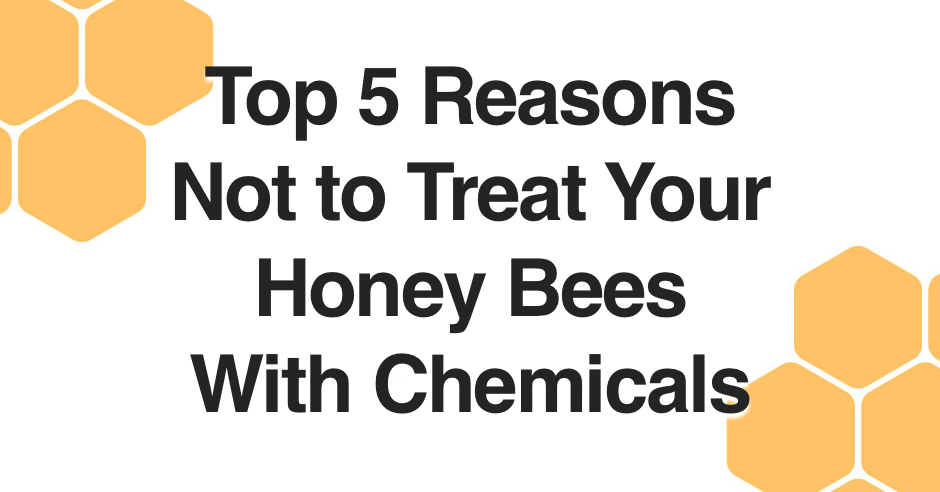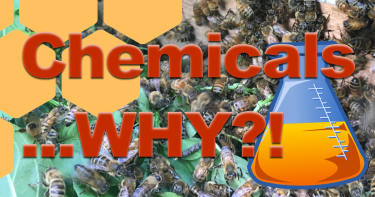If you’ve kept bees for any length of time, you’ve probably come to realize that doing so effectively requires a lot of work. In particular, bees are often vulnerable to disease as well as mites and other pests. Controlling these threats may be quite difficult, and many beekeepers opt to enlist the help of chemical treatments. While these chemicals may be effective in treating certain diseases and pests, their use also comes with a host of other issues.
If you’re wondering whether the use of chemicals may be appropriate for your bees, here are the top five reasons to reconsider.

1. Chemical Treatments are Costly
It’s no secret that keeping bees requires a considerable financial investment, but most beekeepers will happily agree that the cost is well worth the rewards. However, that outlook may change with the introduction of chemical treatments. Some chemicals are very expensive on their own, but even among those that are more affordable, there are hidden costs to consider. Chemicals often work for only a limited time – after while the keeper must switch to one or more other chemicals. Treatments may also serve to prop up weak and unhealthy bee colonies, meaning that the bees are dependent on a steady stream of chemicals to survive.
There are opportunity costs as well. Effectively treating your bees with chemicals requires a large investment of time – both in testing and identifying the appropriate chemicals and in applying them safely – that could potentially be better spent elsewhere. The time you spend treating your bees with chemicals may instead be put to better use by employing traditional beekeeping management practices that contribute to healthy, happy colonies.
2. Chemicals May Lead to Treatment Resistance
Many medical professionals today advise against treating people with antibiotics, antivirals and other medications unless it is necessary and unavoidable. That’s because using these medications improperly or too often increases the risk of developing treatment-resistant diseases. The same, unfortunately, is true of treating bee colonies with antibiotics, fungicides, miticides and other chemicals. The more diseases and pests are exposed to certain chemicals, the more likely it is that they may eventually become resistant – and, in extreme cases, even immune – to such treatments.
This is very bad news for a number of reasons. First, it makes it far more difficult to treat your colonies in the event of a serious disease- or pest-related issue. Second, treatment resistance necessitates the use of more and more chemicals to achieve the same effects, leading to higher costs and a greater risk of unintended consequences. Finally, heavy use of chemicals may have repercussions far beyond your own colonies, as these newly resistant infectious diseases, parasites and pests tend to spread quickly to new areas.
 3. Chemicals are Potentially Hazardous
3. Chemicals are Potentially Hazardous
When it comes to artificial beekeeping treatments, not all chemicals are equal. In particular, while some treatments are virtually harmless to the beekeeper, others may be potentially hazardous. In an article titled “The Arsenal: Our Choice of Chemical Weapons, Randy Oliver states “Some chemicals are relatively safe to handle… some can be dangerous irritants or corrosives that can cause tissue damage, blindness, or death, such as formic or oxalic acids. Some are insidious toxins that may affect you for the rest of your life…” Accidental exposure is possible even when proper precautions are taken, and other people and animals may also be at some risk.
Also concerning is the fact that high costs and declining efficacy cause some beekeepers to use pesticides and other chemicals off-label, treating their colonies with substances that have not been approved for such uses. This means there is even less information available on safety standards and potential toxicity, making it difficult to make informed decisions on treatment options. Finally, some chemical treatments are highly persistent, lingering at detectable levels for long periods of time even after treatment has ceased.
4. Chemicals May Impact Colony Fitness
Treating honey bee colonies with chemicals is done with the intent to prevent or treat diseases or pests and make the bees healthier, stronger and more fit to survive and produce honey. Unfortunately, these treatments may ultimately have the opposite effect. A recent study has suggested that in-hive pesticide use may alter the structure and composition of essential gut microbial communities and threaten other symbiotic microorganisms. This effect may also persist even after treatment has stopped due to the persistence and accumulation of toxic chemicals within the hive.
Though more research is still needed, it’s believed that the overall net result may be poorer colony fitness. This may arise in the form of depressed immune system function, altered activity and social behaviors, impaired metabolic function and other changes that impact the colony’s ability to survive and produce honey. Even if the fine details remain unclear, the potential for subtle but significant negative impacts on colony fitness should be carefully considered before employing chemical treatments.
5. Chemicals May Contaminate Honey
There are two primary concerns when it comes to the specter of chemical contamination of honey. The first, of course, is contamination itself. While most approved chemicals have been tested and found to pose little threat of honey contamination, some treatments do carry a small risk. Improper application methods or off-label use of unapproved chemicals can significantly increase this risk, particularly when it comes to agricultural formulations that are designed to be more readily soluble. The risk is still relatively small, but it’s something with which any beekeeper should be concerned.
The second concern is perhaps more worrying, especially for those who intend to sell their honey publicly. Even if the reality of contamination poses little danger to the public, the fear alone can be great enough to inhibit sales and drive people away. By opting for chemical-free beekeeping methods, you can confidently market your honey as chemical-free – and sell it at a higher price, too. Finally, because these substances may accumulate over time, treating your colonies with chemicals necessitates more frequent replacement of the comb. By avoiding chemicals, you can safely use the comb for a longer period of time without fearing contamination.










3 Comments
You reference Randy Oliver’s article, but it is 11 years old. A lot has changed since then. More up-to-date research and references would give more cred to your opinions.
Ok. you are treatment free. Next spring you new queen flies to a DCA 3 to 5 miles away. She breeds with 10 drones from treated colonies. What have you accomplished ? The civil was soldiers died from infection. We discovered antibiotics. did we say no, no. The longer we dont use antibiotics the sooner we will develope our own resistance to bacteria.
The bedkeeping world would be decimated without treating. Yes, be smart. Rotate treatments. try the MMTT. Try brood breaks now and then and dont be afraid to alcohol wash test for effectiveness.
Thanks for this article. I am also treatment free, and have been since we started years ago. We are not commercial beekeepers and I see no reason why backyard beekeepers can’t stay treatment free. There are always those that claim “you’re a mite bomb” or “people use antibiotics” and when they do, it’s so clear that they really don’t understand how a hive works. Bees are not individuals but the hive as a whole is a superorganism. All treating really does in the long run is make stronger mites and viruses. If the bees are going to die from not being treated, then they will. We are trying to help the bees, not create chemical dependent bees. No one is treating feral bees – and yet they survive and thrive without treatments. Mimic what they do in the wild and your bees will survive and thrive also. Use brood breaks, make splits, do proper management techniques. Breed better and stronger bees that don’t need chemical intervention. Most of those who are against being treatment free do so out of fear, and I can understand that if you are relying on bees for your livelihood. But for those of us who don’t, try it.